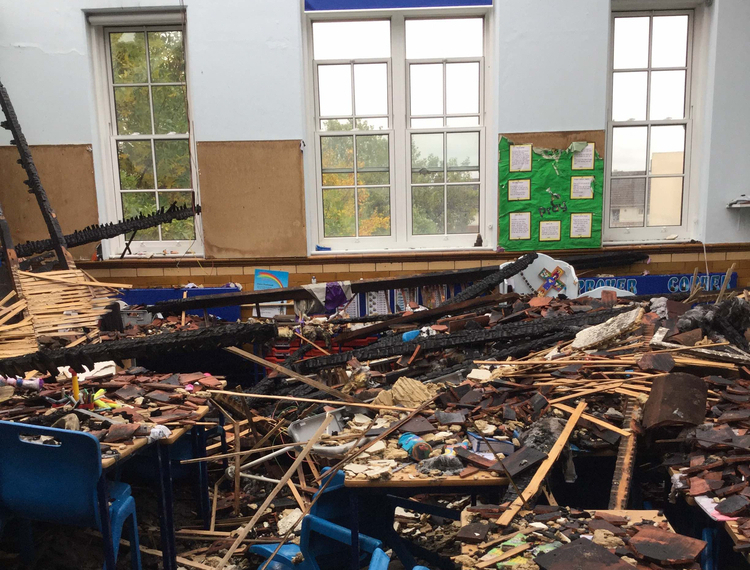Schools #AndColleges are being urged to take precautions over the summer break to lower the risk of fire and arson, as data reveals more school fires occur in August than at any other time of year.
Leading school insurer, Zurich Municipal (@ZurichMunicipal) has released claims data that shows between 2015 and 2020, the number of school fires in August was 44% higher compared to the average across this period. (1)
With many school buildings empty over August, fires can potentially take longer to discover, resulting in more extensive damage. Over the same period (Jan 2015-Dec 2020), the average cost of a fire in August was £8.1m, five times higher than the average of £1.5m. (2)
Arson is a key risk in the lead up to the autumn term. Analysis of Home Office data from all 44 fire authorities in England (3) shows around one in five school blazes are started deliberately, with one in six being large fires resulting in significant damage. (4)
Tilden Watson, Zurich Municipal’s Head of Education, said:
“Burnt out classrooms can cause major disruption to children’s education, with repairs often leading to months or even years of upheaval. As we head towards the summer break, it’s essential schools take adequate measures to combat potential losses as a result of fire and arson. This will minimise the risk of disruption to the start of the new term.”
- Between April 2015 and April 2020, firefighters were called to blazes at 1,467 primary schools and 834 secondary schools
- This destroyed the equivalent of 1,100 classrooms (5). 47 primary and secondary school buildings were completely gutted, and 230 others seriously damaged.
- Zurich estimates the average repair bill for large fires alone is £2.9m, with some fires costing up to £20m.
Zurich Municipal is also renewing its call for sprinklers to be made mandatory in all new or majorly refurbished schools. This follows recent government proposals to only make sprinklers mandatory in Special Educational Needs (SEN) schools, and all schools over 11m in height. Proposals the insurer believes don’t go far enough
Tilden Watson continues:
“Sprinklers are proven to contain the spread of blazes and limit the damage they inflict. However, we believe the government’s latest proposals still leave the vast majority of pupils and schools exposed to blazes. We need to bring England in line with Wales and Scotland, where sprinklers are already compulsory in all new and majorly refurbished schools.”
To help schools manage risk associated with fire and arson, Zurich Municipal has collated the following advice from its experts.
1. Ask teachers and site staff to be extra vigilant whilst on the schools’ grounds during the break. Remind them to switch off any electrical appliances and lock-up the building securely, including checks that windows have not been left open or internal doors left wedged open.
2. Monitor for signs of malicious damage or signs of trespass. Actively take steps to address any areas where damage and access may have occurred. Consider the need for security patrol visits and discuss any concerns with your local Police liaison officer.
3. Check that boundary/security fencing is intact. Ensure gates are fitted with suitable locks and bolts, and that hinges and handles do not act as easy footholds or scaling points to aid access to the site or buildings.
4. Make sure any intruder alarms and other security measures are activated and operating correctly. and the responsibility for doing so is actively agreed and maintained. Any staff on the premises should be reminded to keep all external doors and windows to unattended areas secured whilst inside to avoid intruders getting in.
5. Ensure that movable external play equipment is not left adjacent to the building, and is either relocated to secure non-combustible stores, or secured by other means away from the building.
6. If you’re expecting deliveries for computers or other valuable equipment, be careful how you dispose of the packing; not only can this provide a means for starting a fire but can also be an obvious advertisement of new, valuable and desirable contents.
7. Combustible waste, including recycling material must not be left near the buildings but disposed of via secure waste bins and compounds sited at least eight metres from the buildings.
8. If you’ve got a CCTV system in place, ensure it is functioning correctly and see if you can arrange for remote monitoring that will summon an immediate response should an incident occur.
9. Regularly monitor contractors on site to ensure they are following arrangements in respect of security. Ensure that skips, waste bins and building materials are not located in close proximity to the building.
10. Check fire extinguishers, fire alarms, sprinkler systems are in working order, and ensure safe storage of flammable liquids and waste control. Fire alarms and sprinklers can often get disabled by contractors or visitors during the break – so it’s worth checking these are fully functioning.













Responses